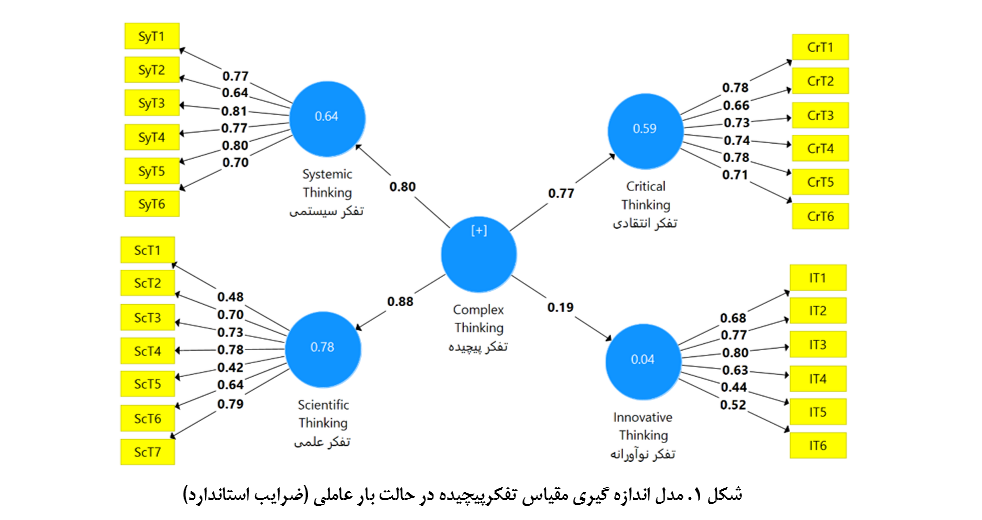پیچیدگی الکترونیکی: اعتبارسنجی و تحلیل معادلات ساختاری مقیاس تفکرپیچیده
کلمات کلیدی:
تفکرسیستمی, تفکرعلمی, تفکرانتقادی, تفکر نوآورانه, معادلات ساختاریچکیده
هدف پژوهش اعتبارسنجی ابزار پیچیدگی الکترونیکی با هدف اندازهگیری ادراک موفقیت در شایستگی تفکرپیچیده و ابعاد آن است. روش تحقیق توصیفی است. پرسشنامه کیفیت ابزار پیچیدگی الکترونیکی کستیلو مارتینرز و رامینرز مونتویا (2022) برای اندازهگیری ادراک دانشجویان میان 270 دانشجوی دانشکدههای علوم تربیتی و روانشناسی شهر تهران توزیع و ارزیابی شد. در بخش تحلیلدادهها با استفاده از آزمون تحلیلعاملیتاییدی به بررسی روایی و پایایی پرسشنامه پرداخته شد. سنجش روایی با شاخصهای بار عاملی، میانگین واریانس استخراج شده و روش فورنل و لارکر استفاده شد. تحلیل دادهها با استفاده از نرمافزارهای SPSS نسخه 28 و Smart PLS نسخه 3 انجام شد. نتایج تحلیل عامل اکتشافی نشان داد با استخراج 4 مولفه از مجموع 25 سوال پرسشنامه، این چهار مولفه توانستند 52 درصد از واریانس کل سوالات را تبیین کنند. نتایج تحلیل آزمون عاملی تاییدی بیانگر بار عاملی مناسب سوالات و تایید روایی واگرا و همگرا بود. همچنین پایایی به روشهای پایایی رو، پایایی ترکیبی و آلفای کرونباخ مورد تایید قرار گرفت. بررسی بخش ساختاری مدل نشان داد شدت همبستگی بین مولفهها با سازه نهایی تفکرپیچیده از حداقل 0.19 برای مولفه تفکرنوآورانه تا حداکثر 0.88 برای مولفه تفکرعلمی بود و تمامی روابط از نظر آماری معنی دار بود(P<0.05). این ابزار میتواند به عنوان ابزار پایا مورد استفاده قرار گیرد.
دانلودها
مراجع
Bancin A, Ambarita B, editors. Education model based on life skill (a Meta- synthesis)2019.
Alt D, Naamati L, Weishut D. Competency-based learning and formative assessment feedback as precursors of college
students' soft skills acquisition. Stud High Educ. 2023;48:1901-17. doi: 10.1080/03075079.2023.2217203.
AlMunifi A, Aleyani A. Knowledge and skills level of graduate civil engineers employers and Graduates' perceptions.
Int J Eng Pedagog. 2019;9:84-101. doi: 10.3991/ijep.v9i1.9744.
Riahi S. Strengthening the teaching of soft skills in the pedagogical architecture of Moroccan universities. Int J Eng
Pedagog. 2022;12:47-62. doi: 10.3991/ijep.v12i4.22329.
Castillo-Martínez I, Ramírez-Montoya M, Torres-Delgado G. Reasoning for complexity competency instrument (ecomplexity): Content validation and expert judgment. Cogent Education. 2024.
Wild S, Schulze L. Re-evaluation of the D21-digital-index assessment instrument for measuring higher-level digital
competencies. Stud Educ Eval. 2021;68:100981. doi: 10.1016/j.stueduc.2021.100981.
Rutherford-Hemming T. "Content validity ratio" in The SAGE encyclopedia of educational research, measurement,
and evaluation: SAGE Publications; 2018.
Baena J, Ramírez M, Mazo D, López E. Traits of complex thinking: a bibliometric review of a disruptive construct in
education. J Intelligence. 2022;10:3. doi: 10.3390/jintelligence10030037.
Horn A, Scheffelaar A, Urias E, Zweekhorst M. Training students for complex sustainability issues: a literature review
on the design of inter- and transdisciplinary higher education. Int J Sustain High Educ. 2022;24:1-27. doi: 10.1108/IJSHE-03-
-0111.
Silva C, Iturra C. A conceptual proposal and operational definitions of the cognitive processes of complex thinking.
Think Skills Creat. 2021;39:100794. doi: 10.1016/j.tsc.2021.100794.
Silva C, Iturra C. Development and validation of the complex thinking assessment. Think Skills Creat.
;48:101305. doi: 10.1016/j.tsc.2023.101305.
Vázquez-Parra J, Castillo-Martínez I, Ramírez-Montoya M, Millán A. Development of the perception of achievement
of complex thinking: a disciplinary approach in a Latin American student population. Educ Sci. 2022;12:5. doi:
3390/educsci12050289.
Vázquez-Parra J, Cruz-Sandoval M, Carlos-Arroyo M. Social entrepreneurship and complex thinking: a bibliometric
study. Sustain For. 2022;14:20. doi: 10.3390/su142013187.
Vázquez-Parra JC, Alfaro-Ponce B, Guerrero-Escamilla J, Morales-Maure L. Cultural imaginaries and complex
thinking: impact of cultural education on the development of perceived achievement of complex thinking in undergraduates.
Soc Sci. 2023;12:272. doi: 10.3390/socsci12050272.
Cruz-Sandoval M, Vázquez-Parra JC, Carlos-Arroyo M, Del Angel-González M. Complex thinking and its relevance
in professional training: an approach to engineering students in a Mexican university. Int J Eng Pedagog. 2023;13:100-19. doi:
3991/ijep.v13i3.36885.
Cui L, Zhu Y, Qu J, Tie L, Wang Z, Qu B. Psychometric properties of the critical thinking disposition assessment test
amongst medical students in China: a cross-sectional study. BMC Med Educ. 2021;21:10. doi: 10.1186/s12909-020-02437-2.
Carlos-Arroyo M, Vázquez-Parra J, Cruz-Sandoval M, Echaniz-Barrondo A. Male chauvinism and complex thinking:
a study of Mexican university students. Societies. 2023;13:5. doi: 10.3390/soc13050104.
Castillo-Martínez IM, Ramírez-Montoya MS. eComplexity: Medición de la percepción de estudiantes de educación
superior acerca de su competencia de razonamiento para la complejidad. Monterrey. 2022.
Abuabara L, Paucar A, Werne K, Villas D. Enhancing systemic thinking by sharing experiences of reading literary
fiction using causal mapping. J Oper Res Soc. 2023;75:158-72. doi: 10.1080/01605682.2023.2180448.
Koerber S, Mayer D, Osterhaus C, Schwippert K, Beate S. The development of scientific thinking in elementary
school: a comprehensive inventory. Child Dev. 2015;86:327-36. doi: 10.1111/cdev.12298.
Koerber S, Osterhaus C. Individual differences in early scientific thinking: assessment, cognitive influences, and their
relevance for science learning. J Cogn Dev. 2019;20:510-33. doi: 10.1080/15248372.2019.1620232.
Saienko N, Olizko Y, Cunha A. Perceptions of fostering creative thinking skills in ESP classrooms in Ukraine and
Portugal. Int J Eng Pedagog. 2021;11:23-41. doi: 10.3991/ijep.v11i4.20129.
Luna J, Tobón S, Juárez L. Sustainability-based on socioformation and complex thought or sustainable social
development. Resourc Environ Sustain. 2020;2:100007. doi: 10.1016/j.resenv.2020.100007.
Ramírez-Montoya M, Castillo-Martínez I, Sanabria J, Miranda J. Complex thinking in the framework of education
0 and open innovation-a systematic literature review. J Open Innov: Technol Mark Complex. 2022;8:4. doi:
3390/joitmc8010004.
Diana N, Latifah S, Yuberti Komikesari H, Rohman MH, Tiyan L. Developing an e-learning-based critical-thinking
assessment as a physics learning evaluation media with Kahoot! Interactive quiz. J Phys Conf Ser. 2021;1796:012055. doi:
1088/1742-6596/1796/1/012055.
Tobón S, Luna J. Complex thinking and sustainable social development: validity and reliability of the COMPLEX-21
scale. Sustain For. 2021;13:12. doi: 10.3390/su13126591.
Ossa-Cornejo C, Palma-Luengo M, Lagos-San Martín N, Díaz-Larenas C. Critical and scientific thinking assessment
in preservice teachers at a Chilean university. Rev Electron Educ. 2018;22:1-18. doi: 10.15359/ree.22-2.12.

دانلود
چاپ شده
ارسال
بازنگری
پذیرش
شماره
نوع مقاله
مجوز
حق نشر 2025 نشریه پژوهش و نوآوری در تربیت و توسعه

این پروژه تحت مجوز بین المللی Creative Commons Attribution-NonCommercial 4.0 می باشد.










